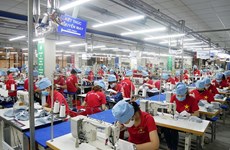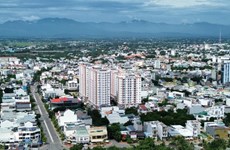Vietnam invests in innovation to fuel growth
Vietnam is seeing positive growth as a knowledge-based economy, as
investments from government complement those coming in from
international technology firms, the Vietnam Business Forum Magazine
(VBF) said, citing a report by a famous institute.
Vietnam is seeing positive growth as a knowledge-based economy, as
investments from government complement those coming in from
international technology firms, the Vietnam Business Forum Magazine
(VBF) said, citing a report by a famous institute.
According to the latest Economic Insight report by The Institute of Chartered Accountants in England and Wales (ICAEW), the country’s capacity is taking off, with economic growth projection hitting 5.8 percent by 2017.
Against the backdrop of a recent emerging markets sell-off, potentially rising interest rates luring investors back to the developed world, and a slowdown in China, ASEAN is looking at a challenging year ahead. Less developed economies such as Vietnam continue to be dependent on commodities, whilst developing neighbours such as the Philippines and Indonesia are striving to make the transition to an advanced-economy mix of exports.
Two things must happen to allow this progress toward higher-value manufacturing: government-led investment in education and skills, and private-sector-led large-scale investment in production.
“Investment in education and skills is key to building a knowledge economy. As one of the developing economies of ASEAN, Vietnam still lags behind its regional peers in the provision of basic education at the primary and secondary level. This is an area the government can look to improve, especially as it is the foundation needed in order to eventually develop a highly-skilled, qualified workforce,” said Mark Billington, Regional Director, ICAEW Southeast Asia.
Knowledge and skills are the best investment for a country looking to build long-term prosperity. Once the foundation of a highly educated workforce is set in place, the extent to which the economy will thrive will depend partly on the amount of inflow of foreign direct investment.
Interestingly, this is an area where Vietnam is flourishing. The economy has seen a recent bout of investments from international technology firms to set up a chip-testing and assembling facility in Ho Chi Minh City, a partnership programme with Finland to fund innovation as well as government efforts to establish a cluster of high-tech SMEs in the country. This presents a hopeful outlook for Vietnam.
Charles Davis, ICAEW Economic Adviser and Cebr Director, said: “Investment is not just about building plants and creating new capacity that way. It is just as necessary that foreign firms setting up new sectors in less-developed economies transfer knowledge and raise workers' skills so they can produce higher value added goods and services.
“In the long term, as these economies grow wealthier, foreign direct investments will increasingly be driven by consumption rather than production, as the large populations of Southeast Asia should provide increasing numbers of affluent consumers.”
Though Vietnam’s innovation economy activities are likely to fuel growth in the medium term, at present they account for just 1 percent of national output and do not significantly outstrip the economy’s overall growth, which has been rapid. It still has significant growth in the mining sector, suggesting that dependence on commodities will continue in the short term.-VNA
According to the latest Economic Insight report by The Institute of Chartered Accountants in England and Wales (ICAEW), the country’s capacity is taking off, with economic growth projection hitting 5.8 percent by 2017.
Against the backdrop of a recent emerging markets sell-off, potentially rising interest rates luring investors back to the developed world, and a slowdown in China, ASEAN is looking at a challenging year ahead. Less developed economies such as Vietnam continue to be dependent on commodities, whilst developing neighbours such as the Philippines and Indonesia are striving to make the transition to an advanced-economy mix of exports.
Two things must happen to allow this progress toward higher-value manufacturing: government-led investment in education and skills, and private-sector-led large-scale investment in production.
“Investment in education and skills is key to building a knowledge economy. As one of the developing economies of ASEAN, Vietnam still lags behind its regional peers in the provision of basic education at the primary and secondary level. This is an area the government can look to improve, especially as it is the foundation needed in order to eventually develop a highly-skilled, qualified workforce,” said Mark Billington, Regional Director, ICAEW Southeast Asia.
Knowledge and skills are the best investment for a country looking to build long-term prosperity. Once the foundation of a highly educated workforce is set in place, the extent to which the economy will thrive will depend partly on the amount of inflow of foreign direct investment.
Interestingly, this is an area where Vietnam is flourishing. The economy has seen a recent bout of investments from international technology firms to set up a chip-testing and assembling facility in Ho Chi Minh City, a partnership programme with Finland to fund innovation as well as government efforts to establish a cluster of high-tech SMEs in the country. This presents a hopeful outlook for Vietnam.
Charles Davis, ICAEW Economic Adviser and Cebr Director, said: “Investment is not just about building plants and creating new capacity that way. It is just as necessary that foreign firms setting up new sectors in less-developed economies transfer knowledge and raise workers' skills so they can produce higher value added goods and services.
“In the long term, as these economies grow wealthier, foreign direct investments will increasingly be driven by consumption rather than production, as the large populations of Southeast Asia should provide increasing numbers of affluent consumers.”
Though Vietnam’s innovation economy activities are likely to fuel growth in the medium term, at present they account for just 1 percent of national output and do not significantly outstrip the economy’s overall growth, which has been rapid. It still has significant growth in the mining sector, suggesting that dependence on commodities will continue in the short term.-VNA













